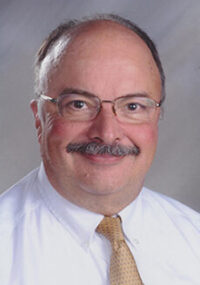Through Holy Spirit, we can do what God wills and experience the peace of Christ

By Tim Irwin
Sixth Sunday of Easter/May 26
Acts 15:1-2,22-29; Psalm 67:2-3,5,6,8; Revelation 21:10-14,22-23; John 14:23-29
A popular Gravy Train television commercial from 1960 featured a dozen ducklings waddling their way into the food dish of a very benevolent Great Dane. One of the ducklings worries about aggravating the dog. Others respond, “Dog, what dog? I don’t see a dog. Do you see a dog?” That’s a pretty good analogy for how many us regard the Holy Spirit. Like the air we breathe, so ever-present is the Holy Spirit in the life of the Church, he can easily go unnoticed. The readings for the Sixth Sunday of Easter explain the purpose the Father has in mind for the Holy Spirit, as well as the Spirit’s presence at a key point in the history of the Church.
Jesus says, “The Advocate, the Holy Spirit, whom the Father will send in my name, will teach you everything and remind you of all that I told you.” The apostles will need all the help they can get. Their lives as part of the crowd-pleasing traveling ministry of Jesus will shortly come crashing to an end. We now know how the story turned out, but they didn’t and they feared the worst. Considering the brutality of Roman justice, their fear seems well warranted.
The readings for the Sixth Sunday of Easter explain the purpose the Father has in mind for the Holy Spirit, as well as the Spirit’s presence at a key point in the history of the Church.
Jesus continues, “Peace I leave with you; my peace I give to you. Not as the world gives do I give it to you. Do not let your hearts be troubled or afraid.” Simple words of comfort will not suffice and so the Father sends the Holy Spirit to grace the Church in what would otherwise be an overwhelming and impossible mission.
Grace, said St. Thomas Aquinas, elevates and perfects nature. We are capable of doing good, but no good we are capable of doing will result in our salvation. We need the Holy Spirit in our lives and in the life of the Church.
TRUSTING THE SPIRIT
The early Church understood this need for the Holy Spirit. The reading from the Acts of the Apostles recounts a pivotal point in the early Church. Christianity began as a movement within Judaism — the Cult of the Nazarene. This led to the question of just how Jewish must one be in order to be a Christian? Some thought very Jewish, requiring that men be circumcised. Paul and Barnabas objected, not because of the dampening impact such a requirement would have on conversions, but because Christ’s death and resurrection had elevated and perfected the old covenant with a new covenant. Thus, some requirements of the old covenant had been superseded.
To settle the controversy, the Church gathered for prayer and reflection in the Council of Jerusalem. This would serve as a model for all future gatherings of this kind — the Second Vatican Council, for example. The Council of Jerusalem, though not an ecumenical council in the later sense, certainly had a universal impact on the Church. They resolved the conflict by teaching that, “It is the decision of the Holy Spirit and of us not to place on you any burden beyond these necessities, namely, to abstain from meat sacrificed to idols, from blood, from meats of strangled animals, and from unlawful marriage. If you keep free of these, you will be doing what is right. Farewell.”
They trusted that through the Holy Spirit, they would do what God willed. Had the decision gone the other way, it seems unlikely that Christianity ever would have emerged from its Jewish roots.
The breath that is the Holy Spirit carries the Word made flesh in Christ Jesus. We are invited to place our trust in the Holy Spirit that we might experience what the spirit-filled have experienced since apostolic times — the Peace of Christ.
—
Tim Irwin teaches theology and philosophy at Notre Dame High School in Peoria. He is a member of Blessed Sacrament Parish in Morton.





